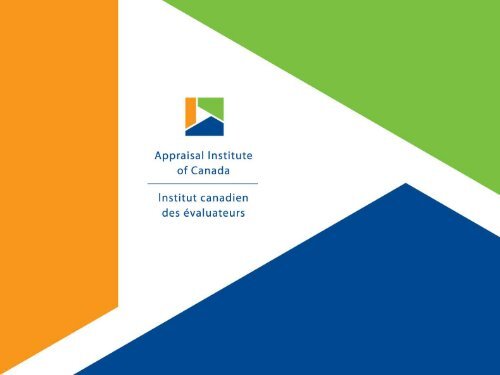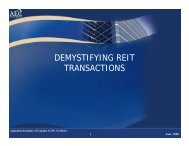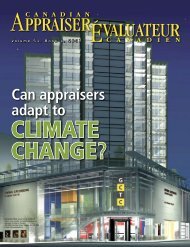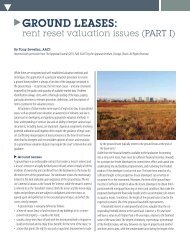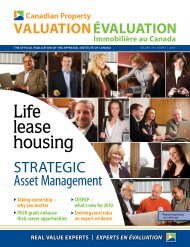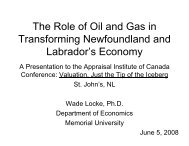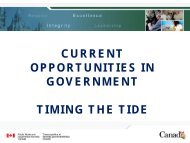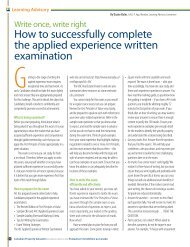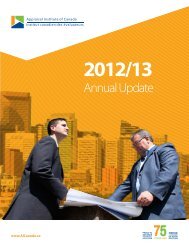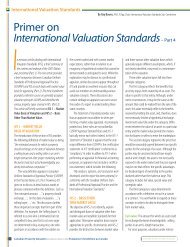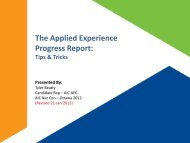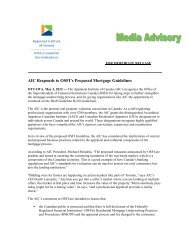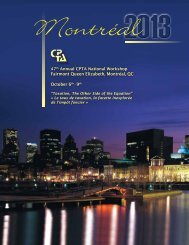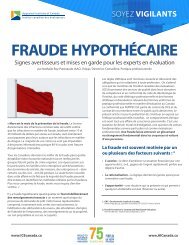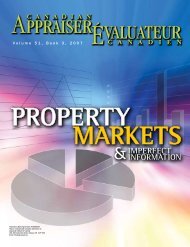open - Appraisal Institute of Canada
open - Appraisal Institute of Canada
open - Appraisal Institute of Canada
Create successful ePaper yourself
Turn your PDF publications into a flip-book with our unique Google optimized e-Paper software.
The Value <strong>of</strong> the AIC<br />
Designation<br />
1
OAMREA<br />
7 October 2011<br />
Strategic Bargaining<br />
Duty <strong>of</strong> Expert & Complaints in Litigation<br />
Presented by:<br />
Robert Patchett<br />
AIC Counsellor, Pr<strong>of</strong>essional Practice,<br />
2
Strategic Bargaining<br />
In real estate municipalities deal with many parties when it<br />
comes to how they acquire, use or dispose <strong>of</strong> real estate<br />
assets. Real estate is typically purchased and sold at fair<br />
market value. In circumstances that involve expropriation<br />
there are other factors that come into play. During these<br />
negotiations is it appropriate to submit a complaint to a<br />
pr<strong>of</strong>essional body regarding the conduct <strong>of</strong> an expert.<br />
This session will discuss the concept <strong>of</strong> immunity afforded by<br />
courts to experts in litigation, and the evolution <strong>of</strong> the<br />
expert’s duty in Ontario. At the end, you should have a<br />
better understanding <strong>of</strong> policy considerations when<br />
contemplating submitting a formal complaint.<br />
© 2011 Robert W. Patchett, All rights Reserved.
http://www.youtube.com/watch?v=Ji4gsInXek0<br />
Go for the full appraisal and not just a drive by, or desk top,<br />
here is why.<br />
© 2011 Robert W. Patchett, All rights Reserved.<br />
4
The <strong>Appraisal</strong> <strong>Institute</strong> <strong>of</strong> <strong>Canada</strong><br />
• National pr<strong>of</strong>essional association established in 1938.<br />
• A self-governing, self-regulating body.<br />
• Accredits and represents some 5,000+ AACIs, CRAs,<br />
Candidates and Students.<br />
• National standards-setter for pr<strong>of</strong>essional appraisal<br />
practice.<br />
© 2011 Robert W. Patchett, All rights Reserved.<br />
5
The Value <strong>of</strong> the designation<br />
• The <strong>Institute</strong> is:<br />
– A relevant player in the marketplace, recognized as the<br />
leader in providing real estate valuation advice and<br />
opinions.<br />
– Responding to the demands <strong>of</strong> our stakeholders and<br />
the marketplace<br />
• AIC designated members:<br />
– Are recognized by the Courts and treated as experts by<br />
the Courts<br />
– Hold key management positions in both the public and<br />
private sector<br />
© 2011 Robert W. Patchett, All rights Reserved.<br />
6
AIC Responsible for the Accreditation <strong>of</strong><br />
AIC Designated Members<br />
• Canadian Residential Appraiser (CRA)<br />
• Accredited Appraiser Canadian <strong>Institute</strong> (AACI)<br />
© 2011 Robert W. Patchett, All rights Reserved.<br />
7
Outline<br />
Changes to Expert Duty in Ontario<br />
Lessons Learned – Courts views <strong>of</strong> Experts<br />
Expert Immunity<br />
Way Ahead...<br />
© 2011 Robert W. Patchett, All rights Reserved.<br />
8
Ontario Changed the Rules 2010<br />
• Changes are Mandatory<br />
• Changes affect the content <strong>of</strong> appraisal reports<br />
• Changes require disclosure <strong>of</strong> instructions provided to<br />
appraiser<br />
• Changes require appraiser to sign a special certificate<br />
• Changes affect the timing <strong>of</strong> delivery <strong>of</strong> expert appraisal<br />
reports<br />
• The changes affect how evidence (expert report) will be<br />
presented not only to Courts but to many administrative<br />
tribunals: ELTO for example<br />
© 2011 Robert W. Patchett, All rights Reserved.<br />
9
Summary <strong>of</strong> Changes<br />
Briefly summarized, the new rules pertaining<br />
to expert witnesses provide:<br />
• Overriding duty to the court<br />
• Can be forced to meet to narrow issues<br />
• Joint statement by experts<br />
• Earlier deadlines for service<br />
• More information and substance required in<br />
report<br />
© 2011 Robert W. Patchett, All rights Reserved.<br />
10
Duty <strong>of</strong> the Expert<br />
4,1.01(1) It is the duty <strong>of</strong> every expert engaged by or<br />
on behalf <strong>of</strong> a party to provide evidence in relation to a<br />
proceeding under these rules,<br />
(a) to provide opinion evidence that is fair, objective and nonpartisan;<br />
(b) to provide opinion evidence that is related only to<br />
matters that are within the expert's area <strong>of</strong> expertise;<br />
and<br />
(c) to provide such additional assistance as the court<br />
may reasonably require to determine a matter in issue.<br />
© 2011 Robert W. Patchett, All rights Reserved.<br />
11
Duty Prevails<br />
(2) The duty in subrule (1) prevails over any<br />
obligation owed by the expert to the party by whom or<br />
on whose behalf he or she is engaged.<br />
BC Supreme Court Rules, Rule 11-2 states slightly differently<br />
to expressly impose a duty on expert witnesses “to assist<br />
the court” and “not to be an advocate for any party”<br />
© 2011 Robert W. Patchett, All rights Reserved.<br />
12
Expert Duty<br />
This Rule does not amend the existing standards for expert<br />
witnesses in civil matters that are handed down from the UK<br />
based on The Ikarian Reefer judgements and amplified by<br />
Canadian Courts<br />
© 2011 Robert W. Patchett, All rights Reserved.<br />
13
Why Expert required<br />
SCC set out the criteria for determining admissibility <strong>of</strong> expert<br />
evidence in court proceedings:<br />
• Relevance<br />
• Necessity in assisting the trier <strong>of</strong> fact<br />
• The absence <strong>of</strong> any exclusionary rule<br />
• A properly qualified expert<br />
• “...a cost benefit analyse... in terms <strong>of</strong> its impact on the trial<br />
process. Evidence... May be excluded on this basis, if its<br />
probative value is overborne by its prejudicial effect, if in<br />
effect, if it involves an inordinate amount <strong>of</strong> time which is<br />
not commensurate with its value or if it is misleading in the<br />
sense that its effect on the trier <strong>of</strong> fact, particularly a jury, is<br />
out <strong>of</strong> proportion to its reliability. ... The reliability versus<br />
effect factor has special significance in assessing the<br />
admissibility <strong>of</strong> expert evidence<br />
14<br />
© 2011 Robert W. Patchett, All rights Reserved.
Role <strong>of</strong> Expert<br />
• Expert evidence presented to the Court should be, and<br />
should be seen to be, the independent product <strong>of</strong> the expert<br />
uninfluenced as to form or content by the exigencies <strong>of</strong><br />
litigation<br />
• An expert witness should provide independent assistance to<br />
the Court by way <strong>of</strong> objective unbiased opinion in relation to<br />
matters within his [or her] expertise<br />
• An expert witness ... should never assume the role <strong>of</strong> an<br />
advocate.<br />
© 2011 Robert W. Patchett, All rights Reserved.<br />
15
• An expert witness should state the facts or assumptions<br />
upon which his [or her] opinion is based. He [or she] should<br />
not omit to consider material facts which could detract from<br />
his [or her] concluded opinion<br />
• An expert witness should make it clear when a particular<br />
question or issue falls outside his [or her] expertise<br />
• If an expert's opinion is not properly researched because he<br />
[or she] considers [there to be] ... insufficient data<br />
…available, then this must be stated with an indication that<br />
the opinion is no more than an provisional one ...<br />
Frazer v. Haukioja, 2008 CanLll 42207 (O.S.C.),<br />
© 2011 Robert W. Patchett, All rights Reserved.<br />
16
Rules <strong>of</strong> Civil Procedure<br />
• Rule 4.1.01 Duty <strong>of</strong> Expert<br />
• Rule 53.03(2.1) Content <strong>of</strong> Expert Report<br />
• Form 53 Acknowledgement <strong>of</strong> Expert Duty<br />
• Other<br />
• Delivery <strong>of</strong> report: 90 and 60 days before pre-trial<br />
• Expert Meeting: Court ordered, focus on joint<br />
statement, and Peer Review<br />
• Limitation on number <strong>of</strong> Experts<br />
© 2011 Robert W. Patchett, All rights Reserved.<br />
17
Sanctions Rule 53<br />
Sanction for Failure to Address Issue in Report or<br />
Supplementary Report<br />
(3) An expert witness may not testify with respect to an<br />
issue, except with leave <strong>of</strong> the trial judge, unless the<br />
substance <strong>of</strong> his or her testimony with respect to that issue is<br />
set out in,<br />
(a)<br />
(b)<br />
a report served under this rule; or<br />
a supplementary report served on every other party<br />
to the action not less than 30 days before the<br />
commencement <strong>of</strong> the trial.<br />
© 2011 Robert W. Patchett, All rights Reserved.<br />
18
The expert should be “a neutral observer who guides<br />
judges and juries through complicated evidence so<br />
that they can draw their own conclusions about the<br />
issues at hand”<br />
(Justice Dickson in R. v. Abbey)<br />
© 2011 Robert W. Patchett, All rights Reserved.<br />
19
Why Experts Fail<br />
• Flaw in methodology<br />
• Lack <strong>of</strong> reality/substance, including assumptions that do not<br />
appear reasonable<br />
• Inappropriate speculation<br />
• Conclusions and/or assumptions not supported by evidence<br />
at trial<br />
• Results do not appear reasonable based on common sense<br />
• Lack <strong>of</strong> objectivity<br />
• Other side’s expert more credible<br />
• Expert opines on the ultimate issue<br />
• Competing valuation theories<br />
© 2011 Robert W. Patchett, All rights Reserved.<br />
20
What Contributes to this Failure<br />
• Low expectation going to court<br />
• Allegiance to the client and/or influence by the client<br />
• Inadequate time and resources for the expert<br />
• Unreasonable or conflicting expectations <strong>of</strong> the expert<br />
• “Wrong” expert selected for the case<br />
• Lack <strong>of</strong> court experience by the expert<br />
• Expert report or testimony is poorly explained and/or too<br />
technical for the lay person<br />
• Expert underestimates level <strong>of</strong> scrutiny to which report will<br />
be subjected<br />
• Client and Counsel Bias (undue influence)<br />
© 2011 Robert W. Patchett, All rights Reserved.<br />
21
Commentary – Too many irrelevant<br />
experts<br />
“As well as being concerned about the proliferation <strong>of</strong> <strong>of</strong>fering<br />
expert witnesses in the field <strong>of</strong> junk science, we should also<br />
be concerned about the proliferation <strong>of</strong> unnecessary expert<br />
witnesses who distort the process especially when their<br />
opinions have no bearing or a twisted bearing on the<br />
evidence in the case”<br />
Pente Investiment Management Ltd. V. Schneider Corp., [1998] O.J. No. 6387<br />
© 2011 Robert W. Patchett, All rights Reserved.<br />
22
Inappropriate “speculation”<br />
Similar to assumptions, an element <strong>of</strong> speculation is required<br />
by an appraiser in certain cases in order to complete their<br />
engagement. To clarify the difference, speculation is<br />
defined as “Reasoning based on inconclusive evidence;<br />
conjecture or supposition”*, rather than conclusions based<br />
on assumptions these are conclusions based on guesses.<br />
*thefreedictionary.com<br />
“based on my knowledge and experience” which an appraiser<br />
can neither prove nor disprove...<br />
© 2011 Robert W. Patchett, All rights Reserved.<br />
23
“ The Supreme Court <strong>of</strong> <strong>Canada</strong> in Athey v. Leonati, observed<br />
that future events need not be proved on a balance <strong>of</strong><br />
probabilities. A future possibility will be given consideration<br />
when it is “a real and substantial possibility and nor mere<br />
speculation” (para 27)”<br />
Doe v. O’Dell [2003] O.J. No 3546<br />
This comment suggests that a framework for exercising<br />
judgment when considering hypothetical outcomes is<br />
required. If there is a choice <strong>of</strong> having to make one or<br />
another guess, the expert should calculate using both<br />
scenarios and reconcile them indicating the reasons for the<br />
guess work.<br />
© 2011 Robert W. Patchett, All rights Reserved.<br />
24
Conclusions not supported by evidence<br />
“The city’s expert witness assessed <strong>Canada</strong>ir’s land as if it<br />
were a medium sized block <strong>of</strong> land and therefore likely to be<br />
sold for immediate high utilization. ...In addition, as<br />
mentioned above, <strong>Canada</strong>ir’s land is not vacant but is<br />
encumbered with depreciated buildings. I do not believe<br />
that by agreeing with the City on the value <strong>of</strong> its buildings<br />
<strong>Canada</strong>ir agreed to have its land assessed as if it were<br />
vacant when in fact it is not”<br />
Saint-Laurent (City) v. <strong>Canada</strong>ir Ltd., [1978] 2 S.C.R. 79<br />
© 2011 Robert W. Patchett, All rights Reserved.<br />
25
Lack <strong>of</strong> objectivity<br />
“... A contingency fee makes [expert] a co-venturer in the<br />
litigation. While he may not appreciate that result, the fact is<br />
that he had lost his neutrality and objectivity”<br />
Bank <strong>of</strong> Montreal v. Citak, [2001] O.J. No. 1096<br />
© 2011 Robert W. Patchett, All rights Reserved.<br />
26
Advocacy<br />
In Pente v. Schneider, the judge criticized the expert<br />
witnesses for advocacy:<br />
“... The reports <strong>of</strong> two witnesses in this case were to my view<br />
an echo <strong>of</strong> Captain Collins in this case... Expert evidence<br />
takes on the appearance <strong>of</strong> advocacy dressed up as expert<br />
opinion”<br />
© 2011 Robert W. Patchett, All rights Reserved.<br />
27
Objectivity and its opposite, Advocacy, are issues about which<br />
the expert should not only be aware, but take steps to<br />
prevent. In cases where objectivity is compromised, the<br />
expert’s evidence and testimony will be disregarded<br />
© 2011 Robert W. Patchett, All rights Reserved.<br />
28
Other Expert more credible<br />
In Saint-Laurent (city) v. <strong>Canada</strong>ir ltd., the courts rejected the<br />
city expert and adopted that <strong>of</strong> <strong>Canada</strong>ir:<br />
“If the Court <strong>of</strong> Appeal was justified in intervening and<br />
dismissing the municipal assessment, was it right in<br />
adopting the valuation <strong>of</strong> <strong>Canada</strong>ir’s expert witness? This<br />
Court is <strong>of</strong> the opinion that this was the only valuation<br />
remaining and that there was no reason to reject it.”<br />
There being an issue with one expert’s report, the other<br />
expert’s was taken as the credible and reliable report.<br />
© 2011 Robert W. Patchett, All rights Reserved.<br />
29
Expert Review Report<br />
An expert was engaged only to review the expert report that<br />
had been prepared which had alleged fraud. As a result,<br />
the judge agreed that the initial report alleging fraud was<br />
deficient and adopted the criticism <strong>of</strong> the review report<br />
prepared by the other side’s expert.<br />
Beaudoin c. Banque de development du <strong>Canada</strong>, [2004] J.Q., no 705<br />
© 2011 Robert W. Patchett, All rights Reserved.<br />
30
Usurp role <strong>of</strong> Court/Judge<br />
The court will not accept the expert’s report and testimony as<br />
evidence where the expert has usurped the function <strong>of</strong> the<br />
Court. Experts must exercise case to avoid making legal<br />
judgements or in providing expert evidence that was not<br />
required to assist the trier <strong>of</strong> fact.<br />
“To review the bank’s procedures and to provide an opinion<br />
with respect to the standard <strong>of</strong> care <strong>of</strong> the bank’s<br />
procedures.”<br />
It is for the court to determine the standard <strong>of</strong> care and any<br />
breach there<strong>of</strong>. Therefore understand your needs when<br />
engaging an appraiser at the outset.<br />
© 2011 Robert W. Patchett, All rights Reserved.<br />
31
In the case <strong>of</strong> valuations, the expert appraiser is required to<br />
use an appropriate methodology to predict or reach<br />
conclusions based on hypothetical situations. As a result,<br />
appraisers will <strong>of</strong>ten reach different conclusions based on<br />
these hypothetical assumptions. They will need to explain<br />
their assumptions and methodology in order for the Courts<br />
to determine whether they are reasonable and lead to the<br />
correct conclusions. These competing valuation theories will<br />
result in concerns and criticisms from judges.<br />
© 2011 Robert W. Patchett, All rights Reserved.<br />
32
Theory in Practice<br />
“On cross-examination, [the appraiser] accepted as correct<br />
statements from p. 18.4 <strong>of</strong> the Canadian edition <strong>of</strong> The<br />
<strong>Appraisal</strong> <strong>of</strong> Real Estate, to the effect that when nonmarket<br />
conditions are detected in a transaction, the sale can<br />
be used as a comparable, but only with great care. The text<br />
also cautions that the conditions <strong>of</strong> the sale must be<br />
adequately disclosed in the appraisal, and (at p. 19.5) that in<br />
the case <strong>of</strong> a distressed seller, an upward adjustment would<br />
probably be necessary to reflect the value the seller is not<br />
recapturing by accepting an expedient <strong>of</strong>fer. The authors<br />
say:<br />
. . . If the sales used in the direct comparison approach reflect<br />
unusual situations, an appropriate adjustment (well<br />
supported by the market evidence) must be made for<br />
motivation or conditions <strong>of</strong> sale. Again, the circumstances <strong>of</strong><br />
the sale must be explained in the appraisal report.”<br />
© 2011 Robert W. Patchett, All rights Reserved.<br />
33
“However, as I noted above, there were a number <strong>of</strong><br />
comparables where, in his report, [the appraiser] failed to<br />
identify the parties to the transaction or identified only one <strong>of</strong><br />
them, and did not identify insolvent sellers. The<br />
circumstances <strong>of</strong> the sales were not explained in [the<br />
appraiser's] report. The full picture became clear only on<br />
cross-examination, which disclosed sales involving bankrupt<br />
or insolvent sellers, non-arm’s length transactions and a<br />
sale by a mortgagee who had taken order absolute. This<br />
created further concern about whether I could have<br />
confidence in and safely rely on [this appraiser’s] opinions<br />
and conclusions concerning the market value <strong>of</strong> the<br />
Property.”<br />
Rainbow Country Estates Ltd. V. Whistler (Resort Municipality <strong>of</strong>), 2010 BCSC 300 (CanLII)<br />
© 2011 Robert W. Patchett, All rights Reserved.<br />
34
Expert Immunity - UK<br />
The UK Supreme Court has handed down judgment<br />
abolishing the immunity expert witnesses have enjoyed for<br />
over 400 years. In Jones v Kaney [2011] UKSC 13 the court<br />
held, by a majority <strong>of</strong> 5 to 2, that there is no justification for<br />
granting expert witnesses immunity from suit in relation to<br />
their participation in legal proceedings nor in relation to any<br />
views they express in anticipation <strong>of</strong> court proceedings.<br />
© 2011 Robert W. Patchett, All rights Reserved.<br />
35
Expert Immunity - USA<br />
In some States, expert witness immunity from civil liability is<br />
being ignored, due to the recognition that an expert has a<br />
responsibility to provide a “duty <strong>of</strong> care” towards the client.<br />
As a result, lawsuits most <strong>of</strong>ten fall under a breach <strong>of</strong><br />
contract and negligence are being allowed.<br />
© 2011 Robert W. Patchett, All rights Reserved.<br />
36
Expert Immunity in <strong>Canada</strong><br />
As a general rule Canadian Courts will take notice <strong>of</strong><br />
developments in other common law jurisdictions. It is too<br />
soon to know if Canadian Courts will follow the UK and US<br />
paths. While Canadian Courts are unlikely to allow lawsuits<br />
against expert witnesses as quickly as in the USA, given the<br />
UK decision, an expert should consider the possibility that<br />
traditional immunity may no longer be certain.<br />
© 2011 Robert W. Patchett, All rights Reserved.<br />
37
The key will be to determine if the loss <strong>of</strong> immunity acts as an<br />
improvement to the system;<br />
• acts as a motivation for experts to testify truthfully and apply<br />
a higher level <strong>of</strong> care in their work product and testimony;<br />
• or detracts from the legal requirements for avoiding<br />
relitigating the underlying conflict, <strong>open</strong> and balanced<br />
testimony, and avoiding defamation <strong>of</strong> the expert caused by<br />
the filing <strong>of</strong> a suit or complaint, to determine<br />
© 2011 Robert W. Patchett, All rights Reserved.<br />
38
Issues in Expert Immunity<br />
• Discourage Experts from providing those services<br />
• Immunity is necessary to ensure that expert witnesses give<br />
full and frank evidence to the court (without fear <strong>of</strong><br />
intimidation, or undue influence)<br />
• Protects from vexatious claims<br />
• Immunity from defamation claims arising out <strong>of</strong> their<br />
evidence<br />
• The duty <strong>of</strong> care to a client does not conflict with the<br />
overriding duty to assist the court, which may require the<br />
expert to act in a way which does not advance the client’s<br />
case.<br />
• Costs<br />
• Has been extended to disciplinary proceedings<br />
© 2011 Robert W. Patchett, All rights Reserved.<br />
39
Role <strong>of</strong> Expert<br />
An expert must:<br />
– maintain a degree <strong>of</strong> objectivity and impartiality<br />
with respect to the evidence that he or she is<br />
presenting<br />
– not provide unconditional support for counsel’s<br />
position<br />
– display objectivity<br />
– advise counsel <strong>of</strong> both the strengths and<br />
weaknesses in his or her case<br />
– not come across as defensive or argumentative<br />
– not be an advocate for his or her client<br />
© 2011 Robert W. Patchett, All rights Reserved.<br />
40
Courts/Judges are likely to take an unfavourable stand with<br />
any party or legal counsel that attempts to use court<br />
documents for an improper purpose during the course <strong>of</strong><br />
litigation.<br />
• That is an expert appraisal report that forms the basis for a<br />
complaint ....<br />
• The court/judge may find that you are usurping his role<br />
• A pr<strong>of</strong>essional complaint may not use same standard <strong>of</strong><br />
care that might be decided by the judge in a civil/criminal<br />
matter [a reasonable belief an appraiser has met the<br />
reasonable appraiser standard]<br />
• This is an attack on credibility <strong>of</strong> expert which is role <strong>of</strong><br />
judge to determine and to decide what weight if any are<br />
afforded an expert’s evidence.<br />
© 2011 Robert W. Patchett, All rights Reserved.<br />
41
Sanctions<br />
Possible sanctions for an expert who fails to adhere to his<br />
role:<br />
• Evidence will be given little or no weight<br />
• Reputation as a "hired gun“ / loss <strong>of</strong> credibility<br />
• Report to pr<strong>of</strong>essional body (after the fact)<br />
• Costs award against non-parties.<br />
© 2011 Robert W. Patchett, All rights Reserved.<br />
42
ELTO<br />
Near and Medium term considerations:<br />
• Enhancing adjudicative expertise, capacity and<br />
excellence<br />
• Better use <strong>of</strong> skills <strong>of</strong> staff<br />
• Cross appointments<br />
• Establish stakeholder advisory committees<br />
• Joint Board rules<br />
• Mediation<br />
© 2011 Robert W. Patchett, All rights Reserved.<br />
43
Niagara Jet Boat Decision<br />
Expertise <strong>of</strong> OMB to decide issues<br />
Niagara River Coalition v. Niagara-on-the-Lake (Town),<br />
2010 ONCA 173 (CanLII)<br />
This decision binds all <strong>of</strong> the ELTO tribunals<br />
“I think that the role <strong>of</strong> experts in the planning process,<br />
and the scope <strong>of</strong> expert evidence at the Board, are<br />
important issues that we at the Board, and the<br />
municipal law community, need to think about, and<br />
come to terms with”<br />
Michael Gottheil, Executive Chair, ELTO – Notes to OBA 16 September 2010.<br />
http://www.elto.gov.on.ca/english/aboutelto/Presentations/presentations.html<br />
accessed 28 September 2011<br />
© 2011 Robert W. Patchett, All rights Reserved.<br />
44
The Way Ahead<br />
• Establish Terms <strong>of</strong> Reference for <strong>Appraisal</strong> Experts and<br />
have property owners acknowledge them when they retain<br />
an appraiser<br />
• Amend RFP to incorporate Expert Duty as set out in Rules<br />
<strong>of</strong> Civil Procedures (and report content and<br />
acknowledgement) (amend legislation?)<br />
• Consider Joint Retainers with home owner consent –<br />
speaks to terms <strong>of</strong> reference and instructions to appraisers<br />
• Training and Educate your Experts<br />
• Peer Review<br />
• Engage Chair ELTO<br />
• Pr<strong>of</strong>essional Standards – CUSPAP<br />
• Pr<strong>of</strong>essional Designations – skills on staff<br />
© 2011 Robert W. Patchett, All rights Reserved.<br />
45
Engage Counsel and Expert early. If they work together:<br />
• Clarify role and expectations <strong>of</strong> the proposed appraisal prior<br />
to accepting assignment – Scope <strong>of</strong> Work<br />
• Always plan as if “in contemplation <strong>of</strong> litigation” so that<br />
expert is not surprised<br />
• Set a budget<br />
• Expect the expert appraiser to discuss the terms <strong>of</strong> an<br />
assignment and to propose a more suitable engagement<br />
that avoids ‘confirm’, ‘validate’ objectives.<br />
• Joint Engagement with property owners, all sit down with<br />
appraiser at outset * Court appointed expert.<br />
© 2011 Robert W. Patchett, All rights Reserved.<br />
46
The Role And Duties Of An Expert<br />
What is expected from the expert (e.g. in assessment<br />
and quantification <strong>of</strong> a claim)?<br />
– Give evidence <strong>of</strong> the proper method to be<br />
adopted in assessing a claim and exceptions to<br />
that method<br />
– Give evidence <strong>of</strong> industry practice<br />
– Give opinions on cause and effect<br />
– Give factual evidence about appraisal techniques<br />
and practices<br />
– Give technical reasons why his or her opinion<br />
should be preferred over other experts<br />
© 2011 Robert W. Patchett, All rights Reserved.<br />
47
Role <strong>of</strong> Counsel & Staff Review*<br />
• Explain the issues to be addressed in the report by the<br />
appraisal expert<br />
• Provide copies <strong>of</strong> all relevant documents<br />
• Identify facts to be assumed by appraiser<br />
• Formulate questions to be answered by appraiser<br />
• Guiding the appraiser on report formatting<br />
• Review draft reports and suggest clarifications<br />
• I would like to acknowledge and give credit due in that this slide and those that follow were<br />
presented to AI-BC Conference by R.Glen Boswall, 1 October 2011<br />
© 2011 Robert W. Patchett, All rights Reserved.<br />
48
Explaining Dispute & Issues<br />
•The lawyer should fully explain: (a) the background to the<br />
lawsuit; (b) the issues in dispute; and (c) the purpose to be<br />
served by the proposed expert opinion.<br />
•This information allows the expert to spot issues, problems,<br />
and opportunities that the lawyer has not identified.<br />
•Seek the information if it is not provided!<br />
© 2011 Robert W. Patchett, All rights Reserved.<br />
49
Providing Documents<br />
•The lawyer should provide copies <strong>of</strong> all relevant and<br />
available documents in his or her possession or those within<br />
his or her power to obtain.<br />
•Tip: The expert should advise as to any additional<br />
documents the lawyer should obtain.<br />
© 2011 Robert W. Patchett, All rights Reserved.<br />
50
Identifying Facts to Assume<br />
•Expert report facts fall into two categories: (a) those to be<br />
assumed by the expert; and (b) those personally known or<br />
directly observed by the expert.<br />
•The lawyer should provide a detailed list <strong>of</strong> any facts the<br />
lawyer wants the expert to assume.<br />
•Tip: The expert should advise the lawyer <strong>of</strong> any other<br />
facts that should be assumed.<br />
© 2011 Robert W. Patchett, All rights Reserved.<br />
51
Identifying Facts to Assume (cont'd)<br />
•The expert may determine the existence <strong>of</strong> other facts<br />
outside the expert’s direct knowledge or observation (e.g.<br />
facts recorded in documents, hearsay, etc.). These are to be<br />
treated as assumed facts until independently proven in<br />
court.<br />
© 2011 Robert W. Patchett, All rights Reserved.<br />
52
Identifying Facts to Assume (cont'd)<br />
•Tip: While it is the lawyer’s job to prove the assumed facts,<br />
the expert can be <strong>of</strong> tremendous assistance by ensuring the<br />
source <strong>of</strong> every fact is recorded either in the report or<br />
elsewhere.<br />
© 2011 Robert W. Patchett, All rights Reserved.<br />
53
Formulating Questions<br />
•With the assistance <strong>of</strong> the expert, if necessary, the lawyer<br />
should formulate the questions that are to be answered in<br />
the expert’s report.<br />
•Tip: The expert should: (a) ensure he or she understands<br />
each question and its purpose; and (b) advise the<br />
lawyer about any other questions that should be asked<br />
and answered in the report.<br />
© 2011 Robert W. Patchett, All rights Reserved.<br />
54
Format Guidance<br />
•The lawyer should provide clear guidance with respect to the<br />
formatting <strong>of</strong> the report, particularly having regard to the<br />
Supreme Court Civil Rules.<br />
•Canadian Uniform Standards <strong>of</strong> Pr<strong>of</strong>essional <strong>Appraisal</strong><br />
Practice section 12.11 says the standards do not dictate the<br />
form, format or style <strong>of</strong> reporting.<br />
© 2011 Robert W. Patchett, All rights Reserved.<br />
55
Suggesting Report Clarifications<br />
•The lawyer should review draft reports and make appropriate<br />
suggestions as to clarification and presentation (but not the<br />
substance) <strong>of</strong> the opinion.<br />
•Tip: The expert is on his or her own on the witness<br />
stand. If the expert is not 100% behind the opinions as<br />
recorded in the report, the expert’s credibility can be<br />
destroyed for the case at hand and beyond.<br />
© 2011 Robert W. Patchett, All rights Reserved.<br />
56
If after all that<br />
The work remains sub-standard<br />
• Establish process <strong>of</strong> internal review to remove contractor<br />
from approved list<br />
• Establish policy <strong>of</strong> filing complaint (at end <strong>of</strong> legal<br />
proceedings)<br />
• Establish policy for civil action for negligence (at end <strong>of</strong> legal<br />
proceedings)<br />
© 2011 Robert W. Patchett, All rights Reserved.<br />
57
AIC Policy<br />
AIC Regulations Rule 5.43<br />
A complaint may be dismissed at any time where the AIC<br />
determines:<br />
• Frivolous, vexatious or trivial, or gives rise to an abuse <strong>of</strong><br />
process<br />
• Complaint made in bad faith or filed for an improper purpose<br />
or motive<br />
• Substance <strong>of</strong> complaint was [or is] appropriately dealt with<br />
in another proceeding.<br />
© 2011 Robert W. Patchett, All rights Reserved.<br />
58
http://www.youtube.com/watch?v=Oy-WACMHad8<br />
Final thoughts on expropriation.<br />
© 2011 Robert W. Patchett, All rights Reserved.<br />
59


